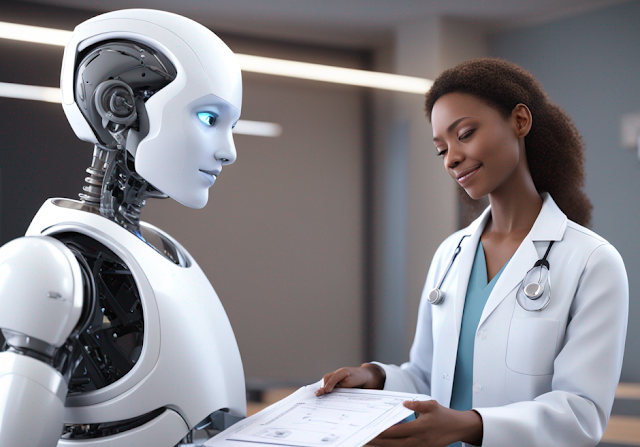How Artificial Intelligence is Revolutionizing the Healthcare Sector
We live in an exciting era where the fusion of Artificial Intelligence (AI) and the healthcare sector is opening doors to an unprecedented medical revolution. As technology advances, the
impacts of AI on healthcare are as promising as they are transformative. Let's explore how this partnership is shaping the future of medicine.
Accurate and Swift Diagnostics:
AI excels in interpreting medical tests with impressive precision. Intelligent algorithms analyze images from X-rays, magnetic resonance imaging (MRI), and computed tomography (CT) scans, identifying patterns that may elude even the most trained eyes. This capability not only
speeds up the diagnostic process but also significantly improves accuracy, resulting in more effective treatments.
Personalized Treatments:
Every patient is unique, and AI is empowering healthcare professionals to provide personalized treatments. Algorithms analyze genetic data, medical histories, and lifestyle
information to create treatment plans tailored to individual needs. This not only increases success rates but also minimizes side effects, providing more efficient and effective care.
Efficient Resource Management:
Behind the scenes, AI is enhancing resource management in hospitals and clinics. Intelligent systems predict future demands, optimize staff allocation, and ensure that supplies are always
available when needed. This efficiency not only improves the quality of care but also reduces operational costs.
Innovation in Medicines and Research:
AI is accelerating medical discoveries and pharmaceutical advances. Algorithms analyze vast datasets to identify patterns and correlations, speeding up the development of new drugs and
therapies. This not only opens doors to innovative treatments but also propels medical research to new heights.
Continuous Monitoring and Prevention:
Connected devices and wearables feed real-time data about patients' health to AI. This continuous information allows for preventive monitoring, identifying patterns that may indicate
health risks even before symptoms appear. Early intervention becomes possible, providing more proactive and preventive care.
In summary, AI is transforming into an indispensable ally in the pursuit of advanced healthcare. Advances in diagnostics, personalized treatments, and efficient resource management not only improve the effectiveness of care but also pave the way for a new era in
medicine where
technology and compassion intertwine to offer smarter and more accessible
healthcare. The AI revolution in healthcare is just beginning, and the benefits
it promises shine as a bright hope for the future of medicine.



Comments
Post a Comment